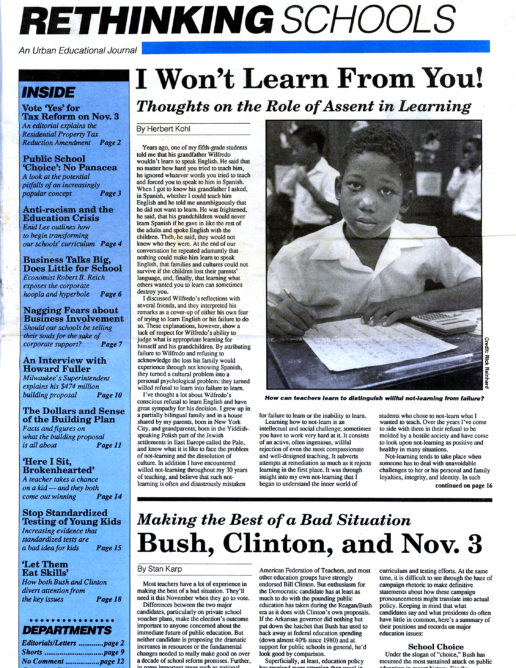Vote ‘Yes’ for Tax Reform on Nov. 3
Property taxes and equity of school finances are hot topics of conversation in Wisconsin. In November, people will be able to do more than talk about the former when they vote on an amendment to the Wisconsin Constitution that would allow for property tax relief for midddle-and low-income families. Next spring, the state legislature should deal with the other matter of equity in school finances.
With regard to school finances, three principles should guide a progressive perspective. First, schools need more resources, particularly urban and depressed rural school districts. Secondly, such revenues should be generated through taxes that are fairer, based on ability to pay.
Finally, the state should mandate equity in school finances so that huge disparities that exist between districts are eliminated.
The Residential Property Tax Reduction Amendment does not by itself guarantee that any of these principles would be adhered to, but it does remove one obstacle to property tax relief and fair forms of taxation.
Furthermore, if the amendment passes and the legislature enacts property-tax relief based on more progressive forms of taxation such as graduated personal income tax or corporate income taxes, then it might make passage of much needed local school building referenda more likely.
On both the state and federal levels the burden of taxation, in the past two decades, has been increasingly shifted to those least able to afford it. Here in Wisconsin, property taxes are a good example.
The state constitution written in 1848 included a “uniformity” clause requiring that all types of property — farms, homes, businesses, and manufacturers — share equally in new tax breaks. The State Supreme Court ruled that the legislature can classify property only for the purpose of completely exempting it from taxation.
Thus, last year when the legislature approved a $30,000 exemption off the value of a person’s home from the school property tax, Governor Thompson vetoed it, saying it was “not constitutional unless a referendum changing the uniformity clause is passed.”
On the other hand, there are over 80 complete exemptions, most of which benefit the rich. For example, two exemptions — manufacturing machinery and equipment, and merchants inventory — have allowed big businesses to receive more than $700 million per year in property tax breaks.
One result has been that since 1970, the percentage of property taxes paid by residential property owners has risen from 47% to 60%, an increase of almost 30%, while the share of the burden borne by industry went down, from 16% to 4.1%, a decrease of 75%.
Wisconsin voters will have a chance in November to begin to change this. They will vote up or down the Residential Property Tax Reduction Amendment, which asks that the Wisconsin constitution be “amended so that the legislature may reduce taxes imposed upon residential or agricultural real property, as defined by law, by authorizing credits against income taxes imposed by the state or payments from state revenues.” If the referendum passes, there is no guarantee that relief will be enacted, or that new forms of taxation would be fairer than the current property tax. People will have to organize to fight for such relief and to ensure that any new forms of taxation are progressive. Moreover, we will have to work to ensure that funding for public education increases and becomes more equitable, regardless of the form of taxation.
Nonetheless, a “yes” vote by the citizens of Wisconsin for the Residential Property Tax Reduction in November would be a small opening in the push for tax reform.

